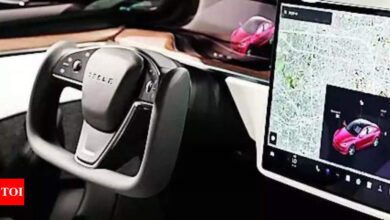Business
‘India fastest growing major market for Lufthansa post-Covid’

[ad_1]
BENGALURU: India has emerged as the fastest growing major market for Lufthansa post-Covid. Since all airlines globally are facing a fleet crunch due to supply chain constraints, the German mega carrier is now pulling out aircraft from other markets to meet the increasing travel demand to and from the country by adding flights and frequencies. Lufthansa Chief Commercial Officer Heiko Reitz says India was the first big market to return and then exceed pre-Covid levels of travel for the airline.
“Our group (including SWISS) had 56 weekly flights to the country till early 2020. In two months we will be at 64 weekly when Hyderabad-Frankfurt starts. From four cities (Delhi, Mumbai, Bengaluru and Chennai) we will be flying to five cities when Hyderabad comes online for us in January. We are already far beyond pre-Covid levels which is exceptional with 14% growth (over 2019). India is one of the very few major network countries to see that happen. Overall Lufthansa is flying less as of now compared to 2019 levels. We are flying less to the US also,” Reitz told TOI in Bengaluru last Saturday when he was there on the inaugural from Munch.
Apart from being the world’s fastest growing major economy with a large booming middle class, the huge Indian diaspora is providing the huge push to international travel. “For instance the number of Indians who have moved to Germany has tripled in the last 10 years. There is significant travel by families of Indians working abroad and we see this growth increasing exponentially. A third of our customers (on flights to and from India) are over 55 years of age. So we there’s a lot of older people also flying there,” he said.
Almost 70-75% passengers on Lufthansa India flights are connecting between third countries and India via its Frankfurt and Munich hubs. North America is the biggest destination (for transiting Indians) followed by Europe. Post Brexit, flying to or from the US by transiting from Germany requires a transit visa.
Lufthansa says it has tweaked the offering on India flights. “A couple of months ago we reintroduced the regional dishes and beverages into our India services so that customers feel comfortable eating the great Indian food. The Indian dishes that we serve have not been selected by Germans. They have been selected by Indians so that we really offer the true Indian taste and not the taste that someone in Germany perceives to be an Indian taste,” he said.
“We’ve increased the range of movies tremendously. Our overall movie numbers has gone up to 300 and there’s a huge range of Bollywood movies.”
The Lufthansa Group has reached out to the Tatas for increased cooperation beyond codeshares to a range of areas like MROs. Asked if a resurgent AI is seen as a challenge or a partner, Reitz said: “One of the reasons why I am here is to deepen relationships with our partners here including airports and AI. We were the sponsor airline for AI to join Star Alliance and we have had a long lasting relationships with AI and Vistara which are merging now. We are happy to see how we can deepen this relationship further.”
Lufthansa says it is “re-imagining” the entire travel experience for passengers that includes a $2.5 billion spend on upgrading the group airlines’ fleets. It is bringing back the double decker Airbus A380 to Delhi route from April 1, 2024. For India, it is also going to focus on how make the journey a seamless one for the one-third over 55 years of age passengers many of who “probably need different attention than the young frequent flyers” and that “we want to have an offer for every age group,” he said.
“We really want to take Lufthansa’s onboard service to the next level. We’ve started a huge program internally where billions are being invested on not just fleet but soft points too like food, movies and entertainment. Small things like giving slippers on our India flights that allow you to walk comfortably. So we have started a project to reimagine our customer experience from A to Z completely for every service class. I want to reinvent the dinner service. People want to be seen way more as individuals. They want to be seen as who they are and they want to be helped and served individually with their needs,” he said.
The Bengaluru-Munich launch has brought back memories of the start of nonstops between Frankfurt and what was then Bangalore in 2001. “We started Bengaluru in September 2001 with a very short planning period. We built up our own catering facility in 45 days for that flight then. Lufthansa was the first Western or European airline to fly into Bangalore. Ten days after this flight started, 9/11 happened. Most routes had to be canceled that summer except for the new Bengaluru one which we continued flying.
Asked how airline navigate the constant change in the unravelling geopolitical situation due to which some airspace’s, like Russian, are out of bound for many of them, he said: “We fly over countries that we’re allowed to and which we deem as safe with no military action. And in the end, our purpose in Lufthansa is to connect people and economies, and then bring the world a bit closer.”
“Our group (including SWISS) had 56 weekly flights to the country till early 2020. In two months we will be at 64 weekly when Hyderabad-Frankfurt starts. From four cities (Delhi, Mumbai, Bengaluru and Chennai) we will be flying to five cities when Hyderabad comes online for us in January. We are already far beyond pre-Covid levels which is exceptional with 14% growth (over 2019). India is one of the very few major network countries to see that happen. Overall Lufthansa is flying less as of now compared to 2019 levels. We are flying less to the US also,” Reitz told TOI in Bengaluru last Saturday when he was there on the inaugural from Munch.
Apart from being the world’s fastest growing major economy with a large booming middle class, the huge Indian diaspora is providing the huge push to international travel. “For instance the number of Indians who have moved to Germany has tripled in the last 10 years. There is significant travel by families of Indians working abroad and we see this growth increasing exponentially. A third of our customers (on flights to and from India) are over 55 years of age. So we there’s a lot of older people also flying there,” he said.
Almost 70-75% passengers on Lufthansa India flights are connecting between third countries and India via its Frankfurt and Munich hubs. North America is the biggest destination (for transiting Indians) followed by Europe. Post Brexit, flying to or from the US by transiting from Germany requires a transit visa.
Lufthansa says it has tweaked the offering on India flights. “A couple of months ago we reintroduced the regional dishes and beverages into our India services so that customers feel comfortable eating the great Indian food. The Indian dishes that we serve have not been selected by Germans. They have been selected by Indians so that we really offer the true Indian taste and not the taste that someone in Germany perceives to be an Indian taste,” he said.
“We’ve increased the range of movies tremendously. Our overall movie numbers has gone up to 300 and there’s a huge range of Bollywood movies.”
The Lufthansa Group has reached out to the Tatas for increased cooperation beyond codeshares to a range of areas like MROs. Asked if a resurgent AI is seen as a challenge or a partner, Reitz said: “One of the reasons why I am here is to deepen relationships with our partners here including airports and AI. We were the sponsor airline for AI to join Star Alliance and we have had a long lasting relationships with AI and Vistara which are merging now. We are happy to see how we can deepen this relationship further.”
Lufthansa says it is “re-imagining” the entire travel experience for passengers that includes a $2.5 billion spend on upgrading the group airlines’ fleets. It is bringing back the double decker Airbus A380 to Delhi route from April 1, 2024. For India, it is also going to focus on how make the journey a seamless one for the one-third over 55 years of age passengers many of who “probably need different attention than the young frequent flyers” and that “we want to have an offer for every age group,” he said.
“We really want to take Lufthansa’s onboard service to the next level. We’ve started a huge program internally where billions are being invested on not just fleet but soft points too like food, movies and entertainment. Small things like giving slippers on our India flights that allow you to walk comfortably. So we have started a project to reimagine our customer experience from A to Z completely for every service class. I want to reinvent the dinner service. People want to be seen way more as individuals. They want to be seen as who they are and they want to be helped and served individually with their needs,” he said.
The Bengaluru-Munich launch has brought back memories of the start of nonstops between Frankfurt and what was then Bangalore in 2001. “We started Bengaluru in September 2001 with a very short planning period. We built up our own catering facility in 45 days for that flight then. Lufthansa was the first Western or European airline to fly into Bangalore. Ten days after this flight started, 9/11 happened. Most routes had to be canceled that summer except for the new Bengaluru one which we continued flying.
Asked how airline navigate the constant change in the unravelling geopolitical situation due to which some airspace’s, like Russian, are out of bound for many of them, he said: “We fly over countries that we’re allowed to and which we deem as safe with no military action. And in the end, our purpose in Lufthansa is to connect people and economies, and then bring the world a bit closer.”
#India #fastest #growing #major #market #Lufthansa #postCovid






